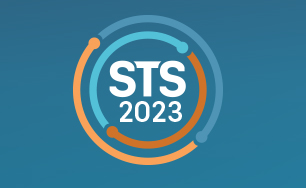ALERT!
This site is not optimized for Internet Explorer 8 (or older).
Please upgrade to a newer version of Internet Explorer or use an alternate browser such as Chrome or Firefox.
STS 2023 Will Celebrate Scientific Triumphs, Surgeon Camaraderie
After 2 years of virtual-only programming, The Society of Thoracic Surgeons’ 59th Annual Meeting (January 21-23, 2023, in San Diego, California) promises an in-person experience that’s better than ever—with late-breaking abstracts, challenging case presentations, immersive experiences, and never-before-seen scientific discoveries and surgical techniques.
Adult Cardiac Offerings Target Optimal Outcomes
Parallel sessions in adult cardiac surgical topics explore why cardiac surgeons should be involved in pulmonary embolism response teams, the management of severe aortic stenosis in young adult patients, optimizing care for infective endocarditis, the heart team approach to complex tricuspid valve disease, and much more.
Hands-on courses cover annular enlargement and mitral valve repair, while “In the OR with” videos take attendees on an immersive journey as world-class surgeons demonstrate complex aortic arch reconstruction, minimally invasive mitral valve repair, and the Ross procedure. The Chamberlain and Clark papers will unveil outcomes data in large patient groups—the former on coronary artery bypass grafting versus multivessel percutaneous intervention, and the latter on the effect of surgical strategy in isolated tricuspid valve procedures.
Congenital Program Is Dynamic with Data
Data-driven outcomes, evidence-based guidelines, and optimizing the landscape for the current and future congenital surgery workforces feature prominently in the congenital surgery curriculum. “To Train or Not to Train?” will include a debate on the regulation of fellowship positions, and “Leveling the Playing Field” will explore whether it’s useful for lower-volume centers to partner with high-volume centers to deliver best results.
Engaging video and abstract presentations will demonstrate single leaflet neocuspidization with autologous pericardium, position of the autograft and homograft in the Ross-Konno procedure, neonatal palliation for high-risk single ventricle heterotaxy, and a novel hybrid palliation technique for a premature newborn prior to Norwood single ventricle palliation. The inaugural James S. Tweddell paper investigates the creation of an STS adult congenital heart surgery risk model, and the Clark paper analyzes the STS National Database for patterns in the management of tetralogy of Fallot.
General Thoracic Sessions Showcase Next-Gen Techniques
Parallel sessions in the general thoracic program highlight topics including controversies in transplant practices, immunotherapy and targeted molecular therapy, and challenging esophageal consults, while an Ask the Experts session titled “Elegant Solutions to Lung Disasters” will show attendees how to salvage pulmonary resections gone wrong. Attendees will gain hands-on expertise in complex central airway reconstruction, and an “In the OR with” video demonstrates uniport segmentectomy and left lower lobectomy.
Among the fascinating abstract presentations are a 20-year experience with salvage esophageal reconstruction with colon interposition, a one-step classifier for molecular differential diagnosis between multiple primary lung cancer and intrapulmonary metastasis, the evolution of pain control for adult pectus excavatum repair, and how the number of involved structures affects outcomes in thymic epithelial tumors. The Chamberlain paper examines racial disparities in patients awaiting lung transplant, and the Clark paper pinpoints how urgent paraesophageal hernia repair in elderly patients is associated with worse outcomes.
Perioperative, Critical Care Topics Bring Results into Practice
An array of offerings in perioperative and critical care includes controversies in perioperative blood management, building an ERAS cardiac program without added cost, contemporary approaches to pain management, phenotypes and unique characteristics of cardiogenic and postcardiotomy shock, and new regulatory standards for resuscitation. A hands-on course covers the V3 exam—volume status, venous access, ventricular function—for CT surgery.
The Clark paper, “The Price of Delay: RV Failure and Biventricular Support” utilizes relevant findings from the Intermacs database, and the Chamberlain paper demonstrates that the COVID-19 pandemic is associated with increased mortality, failure to rescue, and cost across all socioeconomic statuses.
Equity Is Paramount in Wellness, Education, Quality
Surgeon wellness and career advancement take center stage at STS 2023, where a “Surgical Families” session explores unique situations including adoptive parents, parents of children with special needs, surgical trainees and parents, two-surgeon households, and single-parent surgeons. A session on ergonomics helps surgeons avoid injuries that can curtail a career, and Annals Academy provides tips on publishing impactful research, identifying needs and knowledge gaps across disciplines.
In the quality and education realms are sessions on the preoperative assessment of frailty beyond the “eyeball test” and making sense of hospital star ratings, while intriguing abstracts investigate how communication patterns in the OR are affected by task difficulty, how male versus female candidates regard diversity in selecting jobs and training programs, and harnessing natural language processing to evaluate gender bias in letters of recommendation for cardiothoracic surgery applicants. The Vivien Thomas Symposium tackles strategies to improve compliance with lung cancer screening guidelines in underserved areas, gender outcomes in CABG, mitigating disparities across the lifespans of patients with congenital heart conditions, and increasing health equity and transplant volume.
STS Members enjoy significant discounts on STS 2023 registration, and Resident/Fellow and Medical Student Members register for free. There’s still time to register at sts.org/annualmeeting.
